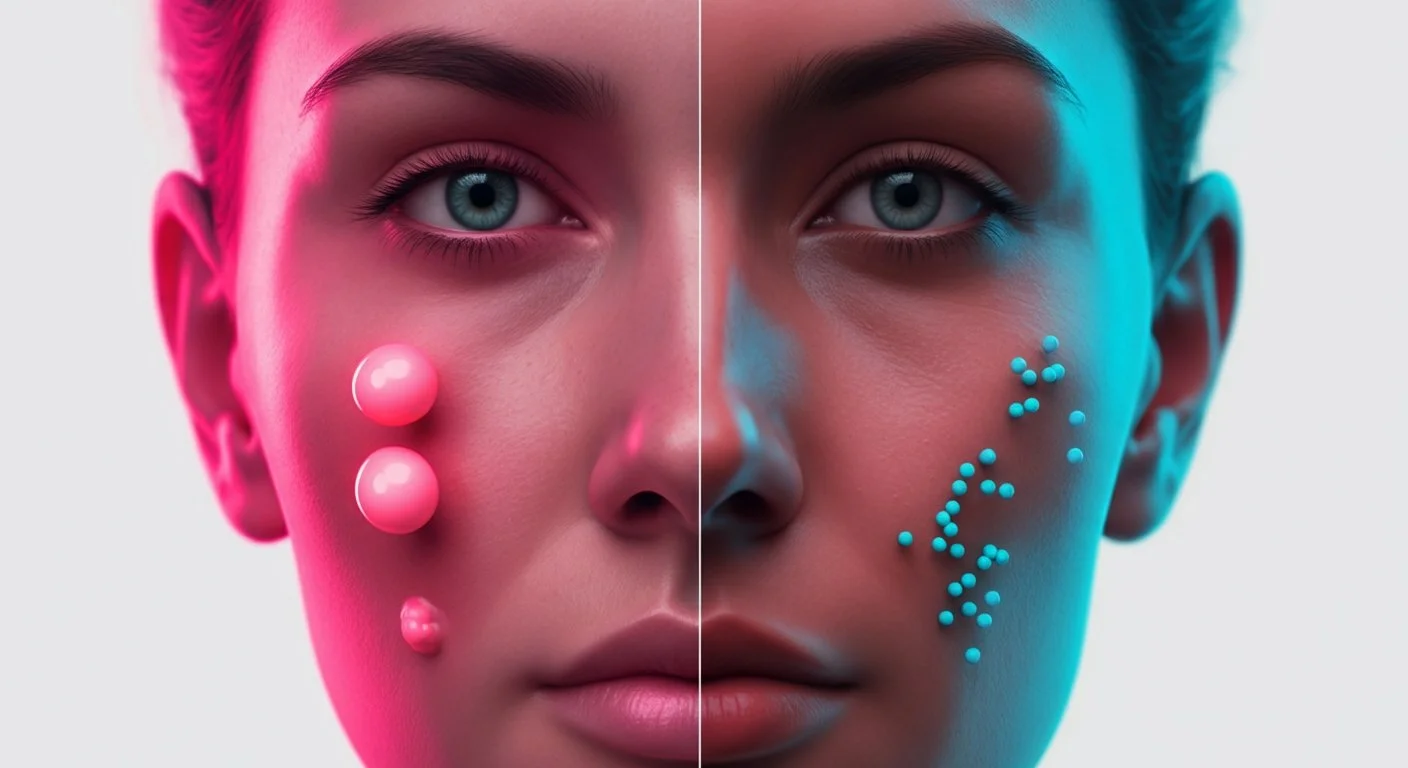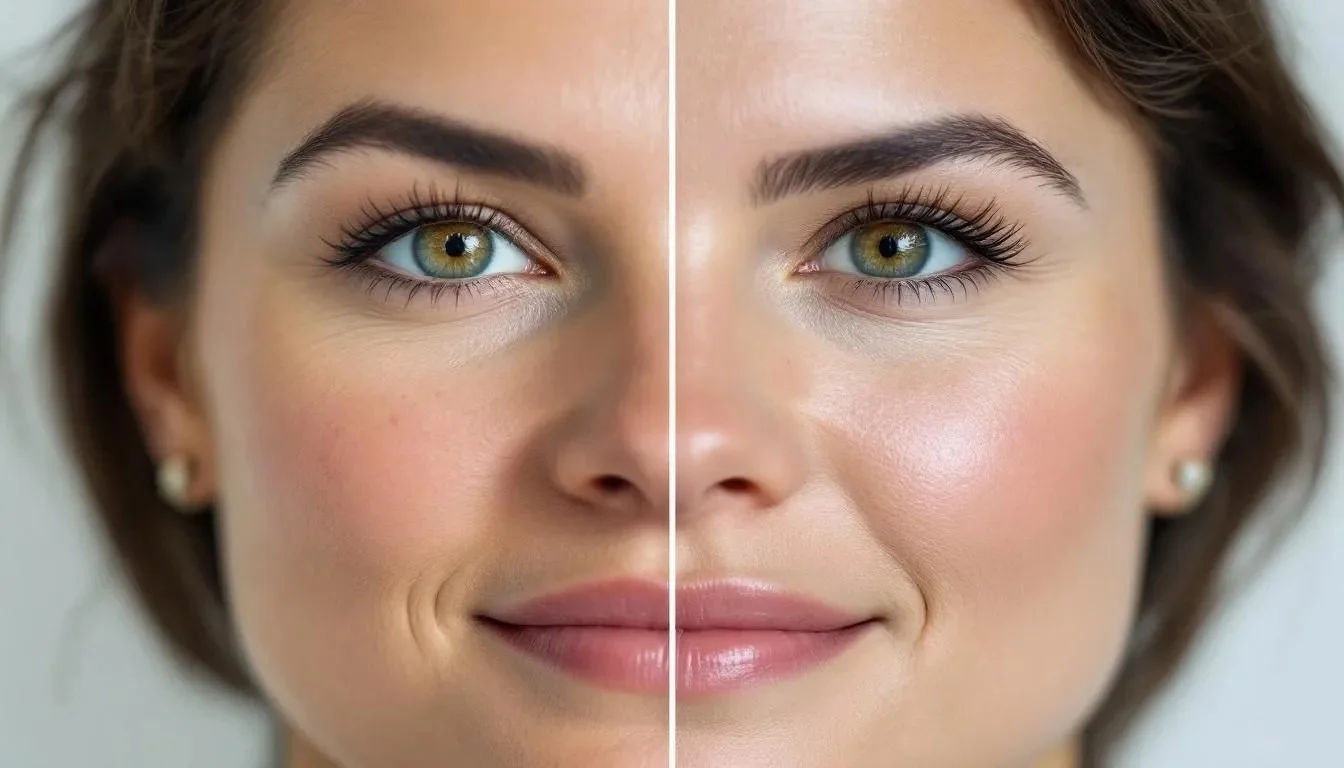Learn key differences between Botox vs Dysport - onset, duration, cost & results. Chicago dermatologist explains which injectable works best for your needs.
When considering injectable treatments for wrinkles and fine lines, two names consistently rise to the top: Botox and Dysport. Both are highly effective neuromodulators that can smooth facial lines and prevent new wrinkles from forming, but understanding the key differences between Botox and Dysport is crucial for making the right choice for your aesthetic goals and individual needs.
While both treatments work through the same basic mechanism – temporarily relaxing muscles that cause dynamic wrinkles – they have distinct characteristics that may make one more suitable for your specific situation than the other. Factors like onset time, duration of results, spreading patterns, and individual response can all influence which product will deliver the best outcomes for you.
Whether you're new to cosmetic injectables or considering switching from one product to another, understanding these differences will help you make an informed decision and achieve the natural-looking results you desire.
Understanding Botox and Dysport: The Basics
What Are Neuromodulators?
Both Botox and Dysport belong to a class of treatments called neuromodulators, which work by temporarily blocking nerve signals to specific muscles. When injected into targeted facial muscles, they prevent the muscle contractions that create dynamic wrinkles – lines that form when you smile, frown, squint, or make other facial expressions.
Botox and Dysport treatments have revolutionized non-surgical facial rejuvenation by offering a minimally invasive way to smooth existing lines and prevent new ones from forming. Both products contain botulinum toxin type A, but they're manufactured by different companies and have unique formulations that create distinct characteristics.
Active Ingredients and Formulations
Botox (OnabotulinumtoxinA):
Manufactured by Allergan
Contains botulinum toxin type A plus human albumin and sodium chloride
Larger protein molecule size
More concentrated formulation requiring reconstitution
Dysport (AbobotulinumtoxinA):
Manufactured by Galderma
Contains botulinum toxin type A plus human albumin and lactose
Smaller protein molecule size
Different dilution ratios and spreading characteristics
These formulation differences contribute to the distinct properties that make each product suitable for different patients and treatment goals.
Key Differences Between Botox and Dysport
Onset of Action: How Quickly Results Appear
One of the most notable differences between Botox and Dysport lies in how quickly you'll see results:
Dysport's Faster Onset:
Results typically visible within 2-3 days
Some patients notice improvement within 24 hours
Ideal for patients who want quicker results
Beneficial for time-sensitive events or occasions
Botox's Gradual Onset:
Results usually appear within 3-7 days
Full effects visible within 10-14 days
More predictable, gradual improvement
Allows for better assessment of treatment effects
This difference in onset time can be particularly important when planning treatments around special events or when patients are eager to see results quickly.
Duration of Results
Both products provide temporary results, but their longevity can vary:
Botox Duration:
Typically lasts 3-4 months
Some patients experience results up to 5-6 months with repeated treatments
Duration may increase with consistent use over time
Generally more predictable timeline
Dysport Duration:
Usually lasts 3-4 months
May have slightly shorter duration in some patients
Individual variation in longevity
Duration often improves with regular treatments
The duration of both treatments can be influenced by factors like metabolism, muscle strength, and individual response to the product.
Spreading Patterns and Diffusion
Understanding how each product spreads after injection is crucial for achieving optimal results:
Dysport's Spreading Characteristics:
Tends to spread more after injection
Covers larger treatment areas with fewer injection points
Better for treating broader areas like the forehead
May require more precise placement to avoid unwanted effects
Botox's Spreading Characteristics:
More localized effect with less spreading
Allows for more precise, targeted treatment
Better for detailed work around the eyes
More predictable and controlled results
Unit Conversion and Dosing
The units of Botox and Dysport are not equivalent, which is important for both efficacy and cost comparison:
Conversion Ratios:
Generally, 1 unit of Botox equals approximately 2.5-3 units of Dysport
This ratio can vary depending on the treatment area and individual response
Dosing should always be determined by an experienced injector
Treatment Area Examples:
Frown lines: ~20 Botox units vs. ~50-60 Dysport units
Forehead lines: ~10-15 Botox units vs. ~25-45 Dysport units
Crow's feet: ~12-15 Botox units per side vs. ~30-40 Dysport units per side
Treatment Areas: Where Each Product Excels
Forehead Lines
Dysport Advantages:
Natural spreading pattern works well for horizontal forehead lines
Fewer injection points needed to cover the entire forehead
Creates smooth, even results across broad areas
May provide more natural-looking movement
Botox Advantages:
More precise control for asymmetrical foreheads
Better for patients who want to maintain more forehead movement
Predictable results with established dosing protocols
Ideal for combination with brow lift effects
Frown Lines (Glabellar Lines)
Botox Advantages:
FDA-approved specifically for glabellar lines since 2002
Extensive clinical data and established protocols
Precise control for deep, stubborn lines
Predictable and reliable results
Dysport Advantages:
FDA-approved for moderate to severe glabellar lines
May work better for patients who have developed resistance to Botox
Faster onset can be beneficial for quick improvement
Natural spreading may create smoother transitions
Crow's Feet (Lateral Canthal Lines)
Botox Advantages:
FDA-approved for crow's feet treatment
Precise control around the delicate eye area
Less risk of affecting surrounding muscles
Predictable results with minimal side effects
Dysport Considerations:
Can be effective for crow's feet but requires careful dosing
Spreading pattern may affect nearby muscles if not placed precisely
May be better for patients with broader crow's feet patterns
Requires experienced injector for optimal results
Individual Patient Factors
Who Might Prefer Dysport?
Fast Onset Preference:
Patients who want to see results quickly
Those treating before special events
People who prefer rapid improvement
Broader Treatment Areas:
Patients with large foreheads
Those needing treatment over wide areas
People who prefer fewer injection points
Previous Botox Tolerance:
Patients who feel Botox effects are wearing off too quickly
Those who want to try a different formulation
People seeking potential cost advantages
Who Might Prefer Botox?
Precision Requirements:
Patients needing very targeted treatment
Those with asymmetrical features
People who prefer predictable, controlled results
Established Protocols:
First-time injectable patients
Those who prefer well-established treatments
People who value extensive clinical research
Sensitive Areas:
Patients treating around the eyes
Those concerned about unwanted spreading
People who prefer gradual onset
Cost Considerations
Price Per Unit Comparison
Understanding the cost difference requires considering both per-unit pricing and unit requirements:
Unit Pricing:
Dysport units are typically priced lower than Botox units
However, more Dysport units are needed for equivalent results
Total treatment cost may be similar or slightly different
Treatment Area Costs: The total cost depends on the number of units needed and the provider's pricing structure. When comparing costs, always consider:
Total units required for your specific treatment
Provider expertise and experience
Quality of service and follow-up care
Long-term value and satisfaction
Value Considerations Beyond Price
Treatment Longevity:
How long results last affects overall value
Frequency of maintenance treatments
Individual response and satisfaction
Provider Expertise:
Experienced injectors like Dr. Monica Rani can optimize results with either product
Proper technique is more important than product choice alone
Quality of care and safety should be prioritized
Safety Profiles and Side Effects
Common Side Effects (Both Products)
Both Botox and Dysport have similar safety profiles and potential side effects:
Injection Site Reactions:
Temporary redness, swelling, or bruising
Minor discomfort at injection sites
Usually resolves within hours to days
Temporary Effects:
Mild headache (uncommon)
Slight drooping if injected improperly (rare with experienced providers)
Temporary weakness in nearby muscles
Product-Specific Considerations
Dysport Considerations:
Faster onset may mean side effects appear more quickly
Spreading pattern requires precise placement
Some patients may experience different side effect profiles
Botox Considerations:
More extensive long-term safety data available
Predictable side effect patterns
Well-established protocols for management
Safety in Expert Hands
When administered by board-certified dermatologists like Dr. Rani at Advanced Dermatology & Aesthetic Medicine, both products have excellent safety records. The key factors for safety include:
Proper patient assessment and selection
Accurate dosing and placement
Understanding of facial anatomy
Experience with both products
Making the Right Choice for Your Needs
Consultation and Assessment
The decision between Botox and Dysport should be made in consultation with an experienced provider who can assess:
Your Specific Anatomy:
Muscle strength and facial structure
Pattern and depth of existing lines
Treatment goals and expectations
Previous experience with injectables
Lifestyle Factors:
Timeline preferences for results
Frequency of maintenance treatments
Budget considerations
Special events or occasions
Individual Response:
Previous reactions to either product
Metabolism and body response patterns
Desired natural movement vs. complete stillness
Combination and Switching Options
Trying Different Products:
It's safe to switch between Botox and Dysport
Some patients alternate products for different results
Individual response may vary between products
Combination Approaches:
Different products may be used in different facial areas
Treatment plans can be customized based on area-specific needs
Experienced providers can optimize results with strategic product selection
Frequently Asked Questions
Can I switch from Botox to Dysport or vice versa?
Yes, it's completely safe to switch between Botox and Dysport. Many patients try both to see which works better for their individual needs. There's no waiting period required between switching products, though it's best to wait until the effects of the previous treatment have worn off to accurately assess the new product's effectiveness.
Is one more painful than the other?
Both Botox and Dysport use similar injection techniques with very fine needles, so pain levels are comparable and minimal. Some patients report slight differences, but this is usually related to individual pain tolerance rather than the product itself. Most patients describe the sensation as a quick pinch or mosquito bite.
Which lasts longer, Botox or Dysport?
Both products typically last 3-4 months, with individual variation. Some patients find one lasts slightly longer than the other, but this varies by person, treatment area, and individual metabolism. Duration often improves with regular treatments regardless of which product is used.
Are the results different between Botox and Dysport?
Both products achieve similar end results – smooth, relaxed facial muscles and reduced wrinkles. The main differences are in onset time (Dysport works faster) and spreading patterns (Dysport spreads more). The final appearance is typically very similar when properly administered by an experienced provider.
Which is better for first-time patients?
Both products are suitable for first-time patients. Botox has more extensive long-term data and established protocols, which some providers prefer for new patients. However, the choice often depends more on your specific anatomy, treatment goals, and provider recommendation than whether it's your first treatment.
Do I need more units of Dysport than Botox?
Yes, due to different formulations, you typically need 2.5-3 times more Dysport units to achieve the same effect as Botox. This doesn't mean the treatment is less effective – it's simply a difference in how the products are measured and dosed. Your provider will adjust the dosing appropriately regardless of which product is used.
Summary
The main differences between Botox and Dysport include onset time (Dysport works faster at 2-3 days vs Botox at 3-7 days), spreading patterns (Dysport spreads more, Botox is more localized), and unit conversion (approximately 2.5-3 Dysport units equal 1 Botox unit). Both last 3-4 months and have similar safety profiles. Dysport may be better for large treatment areas like foreheads due to its spreading nature, while Botox offers more precise control for targeted areas like crow's feet. The choice depends on individual factors including anatomy, treatment goals, timing preferences, and provider recommendation. Both are safe and effective when administered by experienced professionals.
Choose the Right Injectable for Your Goals
Understanding the differences between Botox and Dysport is just the first step – determining which is right for your unique needs requires expert evaluation and personalized treatment planning. At Advanced Dermatology & Aesthetic Medicine, we have extensive experience with both products and can help you make the best choice for your aesthetic goals.
Dr. Monica Rani brings years of experience in facial anatomy and injectable treatments, offering both Botox and Dysport to meet each patient's individual needs. During your consultation, she'll assess your facial structure, discuss your goals and timeline, and recommend the product that's most likely to deliver your desired results.
Every face is unique, and what works best for one person may not be ideal for another. Dr. Rani takes time to understand your specific concerns, whether you're looking to smooth existing lines, prevent new wrinkles from forming, or achieve a particular aesthetic outcome. She'll explain the benefits of each option and help you understand what to expect from your chosen treatment.
Our practice philosophy emphasizes education and collaborative decision-making, ensuring you feel confident and informed about your treatment choice. Whether you're interested in the faster onset of Dysport or the precision of Botox, we'll create a personalized treatment plan that aligns with your goals and lifestyle.
Ready to discover which injectable is right for you? Schedule your consultation today to discuss your options with an expert who truly understands the nuances of both Botox and Dysport. During your appointment, you can ask questions, discuss your concerns, and receive personalized recommendations based on your individual needs.
Don't let confusion about product differences delay your journey to smoother, more youthful-looking skin. Contact Advanced Dermatology & Aesthetic Medicine in Chicago's South Loop today and take the first step toward choosing the injectable treatment that's perfect for you.
Your path to natural-looking, beautiful results starts with expert guidance and the right product for your unique needs. Let us help you make the informed decision that leads to the confident, refreshed appearance you deserve.




